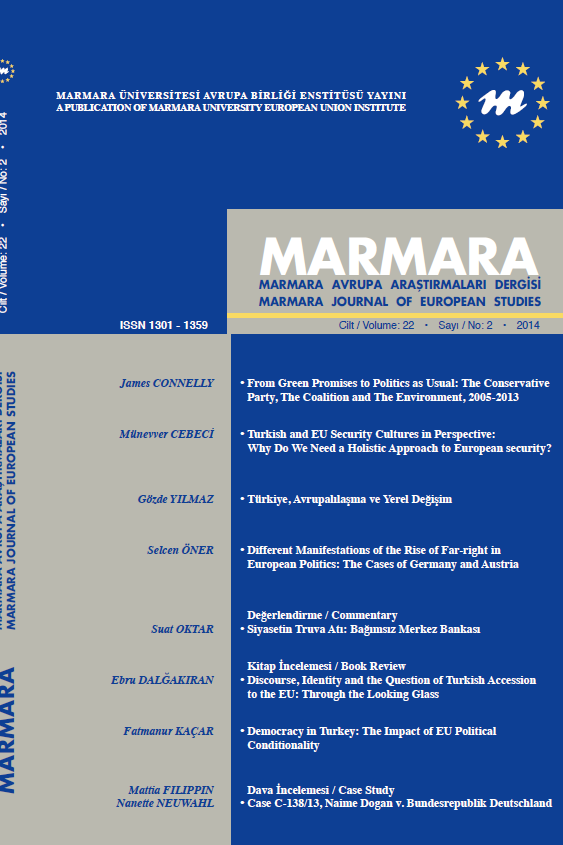TÜRK-ALMAN KÜLTÜREL İLİŞKİLERİNİN TARİHSEL GELİŞİMİ
Bu makalede 18. yuzyzlda Berlin 'e gonderilen ilk Osmanb el9isi Azmi Efendi 'nin ziyareti ile ba~layan Tiirkler ve Almanlar arasmdaki ili~kilerin ozellikle kultiirel boyutta geli~imi dort a~amada ele almmz~tzr. jki devlet arasmdaki kiilturel ili~kiler 19. Yuzyll sonlarrna dogru yogunla~an siyasi, ekonomik, askeri ve toplumsal ili~kilere paralel olarak geli~mi~tir. Ba~langz9ta Aydmlanma hareketi ve Avrupa yz saran Tiirk modasz ile Avusturya ve Almanya 'da Turk dili ve kiilturiine olan ilgi artz~ gostermi~ bunu ozellikle Osmanb ordusunun yeniden yapllanmasz baglammda Almanlarla ba~layan askeri i~birligi takip etmi~tir. Artan etkile~im sonucunda Osmanh jmparatorlugu 'nda ilk Alman kurumlarr olu~turulmaya ba~lanmz~tzr. Bunu takip eden I. Diinya Sava~z oncesi sure9te bazz Turk yazarlarmm Alman kiilturiiniin tamtllmasma katkzda bulunduklarz ote yandan Almanya 'mn emperyalist bakz~ apsz ile ~ekillenmekte olan dogu politikasz kapsamma Osmanh yz da aldzgz goriilmektedir. Tiirkiye Cumhuriyeti'nin kurulu~undan sonra Ataturk'un izledigi 9agda~ politikalar iki iilke arasmdaki kiiltiirel ili~kilerin geli~mesine katkzda bulunmu~ ve Turk universitelerinde bir9ok Alman bilim ve dii~iince adamzmn hizmet verdigi bir doneme ge9ilmi~tir. Bazz kurumlar ve yapzlan 9eviriler sayesinde Alman dil ve kiiltiirii Turkiye 'de tamnmaya devam etmi~tir. 1960 'larda Tiirkiye 'den Almanya ya i~9i g69u ili~kileri yogunla~tzrmz~ ve Almanya 'da ya~ayan onemli bir Turk kokenli niifusun ortaya pkmasma yo! a9m1~tzr. Bu grup arasmda onemli bir g69men edebiyatmm dogdugunu aym zamanda Alman yazarlar arasmda da Tiirklere kar~z dar bakz~b ve onyargzh yakla~zmzmn kmlmakta oldugunu gozlemlemek miimkundiir. jki iilke arasmdaki kiilturel ili~kiler gerek Almanya 'daki Turk kokenli niifusun etkisi gerekse Tiirkiye 'nin AB ye adayllk siireci dogrultusunda geli~mektedir.
TÜRK-ALMAN KÜLTÜREL İLİŞKİLERİNİN TARİHSEL GELİŞİMİ
The article analyzes the development of cultural relations between Germany and Turkey in four phases starting from the 18th century when the first Ottoman consul to Berlin, Azmi Efendi, made his first visit. These relations developed in parallel with the political, economic, military and societal relations between the two states that steadily increased towards the end of the 19th century. Interest towards Turkish language and culture began to grow in Germany and Austria with the effects of the Enlightenment and the 'Turquerie' trend that spread all over Europe. This was followed by the military cooperation between Germany and the Ottoman Empire that started within the framework of the efforts at modernization of the Ottoman army. The increasing interaction between the two countries led to the emergence of the first German institutions in the Ottoman Empire. In the period preceding the First World War some Turkish writers contributed to the introduction o f the elite to German language and culture. On the other hand Germany began to pursue an Eastern policy that included imperialistic aims towards the Ottoman Empire.The westernization process started by Atatiirk after the foundation of the Republic contributed to the further development of cultural relations between the two countries. In the ensuing years several prominent German academics and scientists had the opportunity to do research and give lectures in Turkish universities. Owing to the efforts ofseveral institutions and especially translation ofmajor works from German, German language and culture attained a higher level of recognition among the Turkish public. In the 1960's labor migration from Turkey to Germany increased contact between the two countries and led to the incidence of a considerable Turkish population living in Germany. A significant migrant literature sprang out ofthis group. In parallel to this it is also possible to discern that German writers began to adopt a more tolerant approach towards German Turks and Turkey. Cultural relations between Turkey and Germany is becoming closer and more diversified due to the influence of both Turkish immigrants in Germany and Turkey's integration process to the EU.
___
- -
- ISSN: 1301-1359
- Yayın Aralığı: Yılda 2 Sayı
- Yayıncı: Marmara Üniversitesi
Sayıdaki Diğer Makaleler
TÜRK-ALMAN KÜLTÜREL İLİŞKİLERİNİN TARİHSEL GELİŞİMİ
ALMANYA'DAKİ TÜRKLERİN KÜLTÜREL KİMLİĞİ
IN CELEBRATION OF THE 60TH BIRTHDAY OF PROF. HAGEN LICHTENBERG
THE EFFICIENCY OF HARMONISATION OF TURKISH BANKING REGULATION FOR RISK MANAGEMENT WITH THE EU
BANKANIN MÜŞTERİLERİNİN SIRLARINI SAKLAMA YÜKÜMLÜLÜĞÜNÜN SINIRLARI
Gülören TEKİNALP, Ünal TEKİNALP
RECENT PARLIAMENTARY ELECTIONS IN THE TURKISH REPUBLIC OF NORTHERN CYPRUS
